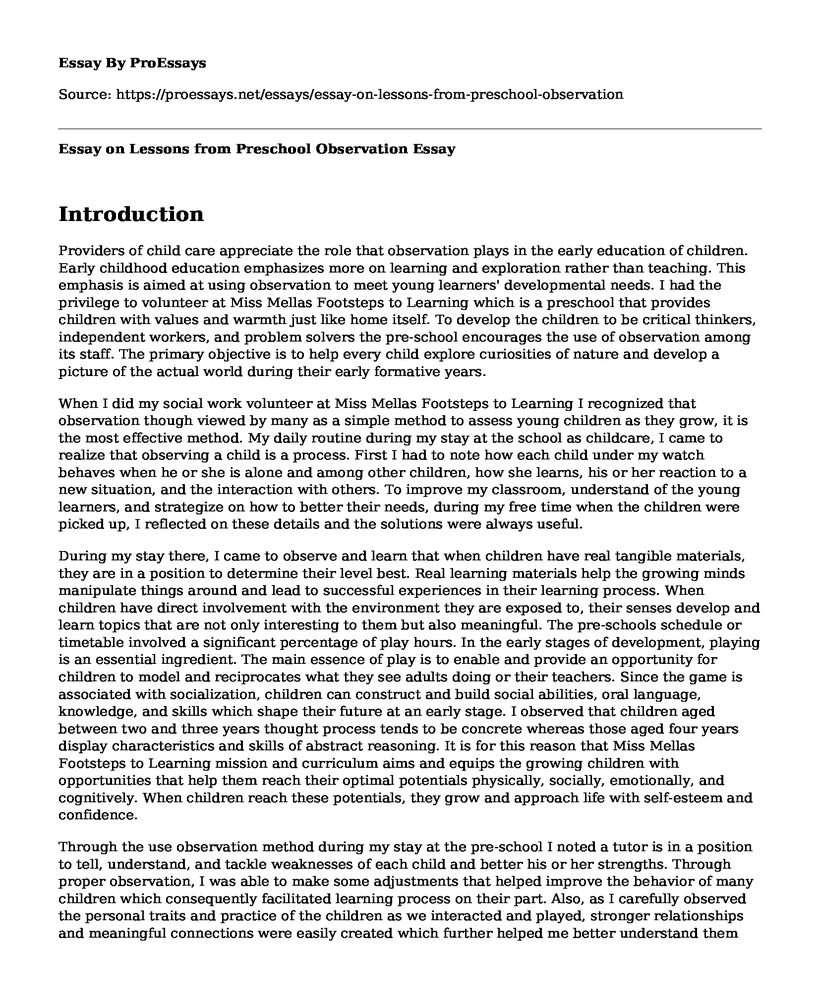Introduction
Providers of child care appreciate the role that observation plays in the early education of children. Early childhood education emphasizes more on learning and exploration rather than teaching. This emphasis is aimed at using observation to meet young learners' developmental needs. I had the privilege to volunteer at Miss Mellas Footsteps to Learning which is a preschool that provides children with values and warmth just like home itself. To develop the children to be critical thinkers, independent workers, and problem solvers the pre-school encourages the use of observation among its staff. The primary objective is to help every child explore curiosities of nature and develop a picture of the actual world during their early formative years.
When I did my social work volunteer at Miss Mellas Footsteps to Learning I recognized that observation though viewed by many as a simple method to assess young children as they grow, it is the most effective method. My daily routine during my stay at the school as childcare, I came to realize that observing a child is a process. First I had to note how each child under my watch behaves when he or she is alone and among other children, how she learns, his or her reaction to a new situation, and the interaction with others. To improve my classroom, understand of the young learners, and strategize on how to better their needs, during my free time when the children were picked up, I reflected on these details and the solutions were always useful.
During my stay there, I came to observe and learn that when children have real tangible materials, they are in a position to determine their level best. Real learning materials help the growing minds manipulate things around and lead to successful experiences in their learning process. When children have direct involvement with the environment they are exposed to, their senses develop and learn topics that are not only interesting to them but also meaningful. The pre-schools schedule or timetable involved a significant percentage of play hours. In the early stages of development, playing is an essential ingredient. The main essence of play is to enable and provide an opportunity for children to model and reciprocates what they see adults doing or their teachers. Since the game is associated with socialization, children can construct and build social abilities, oral language, knowledge, and skills which shape their future at an early stage. I observed that children aged between two and three years thought process tends to be concrete whereas those aged four years display characteristics and skills of abstract reasoning. It is for this reason that Miss Mellas Footsteps to Learning mission and curriculum aims and equips the growing children with opportunities that help them reach their optimal potentials physically, socially, emotionally, and cognitively. When children reach these potentials, they grow and approach life with self-esteem and confidence.
Through the use observation method during my stay at the pre-school I noted a tutor is in a position to tell, understand, and tackle weaknesses of each child and better his or her strengths. Through proper observation, I was able to make some adjustments that helped improve the behavior of many children which consequently facilitated learning process on their part. Also, as I carefully observed the personal traits and practice of the children as we interacted and played, stronger relationships and meaningful connections were easily created which further helped me better understand them and grow their young minds positively.
To extend curriculum plan and learning experiences we used different observations approaches. I kept a record of each child which helped me build the best way to deal with each child to improve his or her learning. To provide parents with what their children have been reading and for future reference, I supplemented my notebook with videos and pictures capturing children learning. This improvised method of observation helped me highlight critical areas that any child in my class had difficulty with and those that they were best positioned. When filed and presented to parents or tutors of the next level of education, it will be helpful in the development of effective future practices of a child.
Conclusion
When observation is embraced in education during the stages of child development, it gives a far detailed and accurate reading of the real progress in the event of a child, unlike the traditional testing. The conventional method of using test is less effective when compared to observation since it only gives a parent or a teacher a glimpse of how a child performs at a certain point whereas view is a continuous process. Use of test is not a reliable method to measure skill since at a particular time even the smallest of things can affect the way a child performs. Factors like boredom, tiredness, and hunger can hinder a child demonstration of the skills learned when assessment period comes. However, observations that are recorded provide accurate performance picture of a child in critical developmental areas.
Cite this page
Essay on Lessons from Preschool Observation. (2022, May 23). Retrieved from https://proessays.net/essays/essay-on-lessons-from-preschool-observation
If you are the original author of this essay and no longer wish to have it published on the ProEssays website, please click below to request its removal:
- Child Welfare Social Work Students Annotated Bibliography
- Essay on Young Adults Experiencing Major Life Milestones Later Than Their Parents
- High School to College Readiness: Unprepared Students - Essay Sample
- MSN Specializations at Walden University - Research Paper
- Essay Sample on Schools' Safety: Securing Kids' Future from Intruders & Active Shooters
- Essay Sample on My Dream of Visiting the Bible Land Museum in Israel
- Free Report on English Language: Key to International Job Market Success







